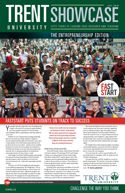
 |
 DEFACTO Robertson Davies' Curtain Call Close to a decade after his death, Robertson Davies' Theatre Diaries are getting a curtain call. His writing offers us a new understanding of Ontario's cultural history; and the Davies Diaries Project will make his personal account more accessible to all. Dr. Joel Baetz, working alongside Trent professors emeriti Dr. James Neufeld and Dr. Zailig Pollock and graduate students on the project, says Davies' diaries detail his impressions about the development of Ontario theatre, specifically, and Canadian cultural production, generally. Davies was a critic, journalist, playwright and professor and he kept meticulous and voluminous records of his incisive commentary on an array of topics. His Theatre Diaries will be the first of nearly three million of his words to be digitized. Davies himself said his diaries are “the stuff of which social history is made...” and according to Prof. Baetz, preliminary transcriptions prove it to be true. Mork calling Canada. Come in Canada. UFO sightings in Canada? Who knew? The federal government, that’s who. In fact, there's 9,500 previously classified documents, compiled between 1947 and the early 1980s, to prove it. Over the last decade, the contents of the archive entitled “Canada’s UFOs: The Search for the Unknown,” have been released. And Matthew Hayes, a graduate student in the Trent-Carleton Canadian Studies PhD program, has been called upon to examine its existence. While other countries have simply reported UFO sightings, Canada’s archive contains a wealth of correspondence from four major departments and agencies – National Defence, National Research Council, Transport and the RCMP. The additional content includes, for example, policies and procedures to follow in case of a UFO landing. If they weren't afraid of an alien abduction, why did government officials keep these records? Mr. Hayes’s research – at the intersection of science and the supernatural – suggests in part, that Canada considered UFOs a legitimate scientific phenomena. Caribou More Than Just Currency Much more than a fixture on our country's twenty-five-cent piece, Canada’s caribou are also the world’s most mobile land mammal, says Dr. James Schaefer, professor of Biology, who has been studying the iconic species for more than 30 years. Caribou are legendary for their migration, their yearly return to traditional calving grounds, and their dramatic rise and fall in numbers. Now, a study has uncovered a link among these features — the way caribou move across the landscape provides a telltale sign of their abundance. The study was conducted by Prof. Schaefer and Shane Mahoney, executive director, Newfoundland & Labrador Department of Environment & Conservation. They tracked more than 600 female caribou on the island of Newfoundland over three decades, coinciding with spectacular growth and decline of the population — from 23,330 animals (1975) to 95,810 animals (1997), then down to 32,170 animals (2008). Caribou showed a dramatic shift in the timing of migration. Finding Clues to Conservation — On the Fly It's working on fruit flies, but will it work on wildlife? Trent researchers and their colleagues at Princeton are looking to find out. Their testing of a new genome-wide sequencing method has been successful — on the fly. And now it's time to take the testing outside of the lab — and up the food chain. Multiplexed shotgun genotyping (MSG) has the potential to change the face of genomics research, making it more accessible in the natural resources sector. For Trent alumna and post-doctoral fellow Dr. Linda Rutledge and Ontario Ministry of Natural Resources & Forestry research scientist and adjunct professor Dr. Brent Patterson, it will provide clues critical to wildlife conservation. With funding from the Ontario Genomics Institute, their focus will be the conservation of the eastern wolf — a species at risk in Canada.
|
































